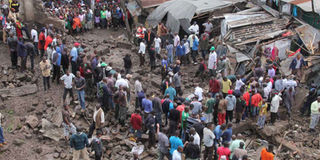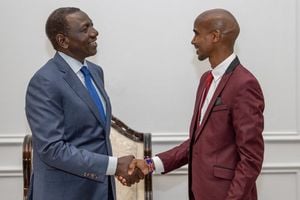Mystery of teenagers killed by police officers in cold blood

Residents of Mukuru slum. Locals accuse police of carrying out extra-judicial killings. PHOTO | FILE | NATION MEDIA GROUP
What you need to know:
- The bodies had gunshot wounds to the upper and lower back. Two were shot in the back of their heads.
- Police accused of driving young men into violence and extremism.
One Tuesday evening in April 2016, a distress call was made to the police post in Nairobi’s Kwa Reuben slum.
The caller said more than 15 youngsters who “were up to no good’’ were meeting in Zone Rurie.
Two police officers responded and within minutes of their arrival, eight high school students, including the son of the caller, lay dead in the dirty pavements.
The boys were on holiday and the agenda of the meeting was to clean up their villages.
EXECUTION
They were identified as Shadrack Omuroka,16, Nixon Obure, 16, William Matendu, 19 and Francis Kioko, 17. The others were Samuel Ndegwa,19, John Mwangi, 17, Elisha Mushughadi and Albert Nyachae, both 24.
Their parents insist they were victims of extrajudicial execution or mistaken identity. Police contradict them.
According to Kioko's mother Stellamaris Nthenya, survivors of the incident said when a police officer, commonly known in the area as ‘’Kamsee’’ arrived at the scene, he started shooting.
BATHROOM
“He first shot Kioko who standing addressing the rest of the seated boys," she said.
“When the rest of the boys saw this, they tried to escape by running into a nearby public bathroom. The officers ordered two women who were also in the meeting to go away.”
After the women who had children left, the officers pulled the boys out of the bathroom one by one and shot them at close range, ignoring their protestations of innocence and pleas to spare their lives.
MEETING
When the guns fell silent, residents crowded the place to see what had happened, but the officers kept them at bay by firing in the air.
“My 14-year-old son ran to our house and told me his brother had been shot three times," Ms Nthenya said.
“I fainted. I did not know what to do. I had been with Kioko earlier in the day before I left for Mater Hospital and he told me they would be having a meeting. I could not believe he had been killed.”
SCREAMING
When Ms Nthenya gained her senses, she asked her husband to accompany her to the scene.
There, her other son was wailing as he tried to lift the bloody body of his brother, his life ebbing away.
“He was too heavy for him and no one could help him because the policemen did not allow them to. Kioko was still breathing. He kept trying to say something but the words wouldn’t come out. People who had gathered started screaming at the officers," she said.
FIVE HOURS
“We tried helping them, but the policemen could not allow us to move close. They kept firing in the air to disperse the crowd. Some of the boys were dead, others struggled to move and speak. Eventually my son gave up on his brother and just sat next to him until the bodies were taken away.”
The bodies were removed from the scene at 10.30pm, more than five hours after the boys had been killed.
“When the other policemen from the DCI came to analyse the scene of crime, Albert, was still alive but he was loaded into the vehicle with bodies,” she said.
STRUGGLED
Until his death, Kioko, a first born in his family was a Form Three student at Ndumbi Secondary School on the sponsorship programme of Our Lady of Nazareth.
He dreamt of becoming an engineer.
Ms Mary Wanjiru said her brother Samuel Ndegwa was the only family she had. Her parents died years ago.
“I had lived with him, raised him and struggled to pay his fees at St Bakita Secondary School in Nakuru. Sometimes, he stayed at home when I lacked fees,” Ms Wanjiru said.
MORTUARY
Ms Wanjiru said she had been trying to reach her brother without success a day after the shooting.
Around 3pm, her husband called and told her that eight boys had been killed the previous day and he had heard from neighbours that Ndegwa was among them.
“I went to the police post and the officer referred me to the mortuary. When I arrived, I identified him,” she said.
He had bullet wounds in his armpits, indicating that he was shot while raising his hands.
MEMORIES
Mr Josephat Ongaya, the father of Shadrack Omuroka who was a Form Two student at Tueni Secondary School in Murang’a County, said his son was not a thief.
“I have always asked myself why he was killed. If they stole anything, which I doubt, why were they not arrested? My son's body had five bullet wounds. The painful memories of that day will never be erased from my mind,” Mr Ongaya said.
MUGGED
According to a police situation Report, commonly known as SitRep, a day after the shooting, the boys engaged the officers in a shootout.
“Three homemade guns and four rounds of ammunition were found on the suspects who have been terrorising residents. Also found were crude weapons. They mugged and stabbed a man to death in a robbery on Falcon Road on Monday night before escaping into the expansive slum. The gang has been notorious in attacking and robbing residents” the report said.
SENT AWAY
Angry residents held protest demos for two weeks, demanding the two officers be arrested and charged with murder.
Nothing happened. Two years down the line, the officers are still at the same station.
Two weeks after the shooting, Rose Eseme, the mother of Nixon Obure, then a Form 2 student at Star Secondary School in South B, was told to leave her her matrimonial home in Kisii County.
JUSTICE
“He was my only son. I have four daughters. My husband and his people sent me away because I did not have a son. They said I initiated my son into crime,” she said.
Different organisations, including the Independent Medico Legal Unit, Independent Policing Oversight Authority and the International Justice Mission have expressed interest in working with the parents in their quest for justice.
LOST HOPE
“During the Machozi Ya Jana community dialogues on extrajudicial killings, a recurring message from young men was that their experience of oppressive policing in their neighourhoods increases their inclination to violence and extremism. This may explain why young people are no longer afraid of being killed since they have lost hope," Ms Wamaitha Kimani, IJM’s Director of System Reform said.
LOWER BACK
“It is paramount for police officers to follow due process by arresting and charging lawbreakers. This builds the trust of the community in the police and empowers officers to focus on crime prevention.”.
Postmortem examinations commissioned by Imlu concluded all the boys sustained multiple gunshot wounds to the upper and lower back.
Two of the boys were also shot in the back of their heads.
OBLIGATIONS
“The report contradicted police reports that the youngsters were killed in a shootout,” Imlu said.
"They were summarily executed. The National Police Service is mandated to exhibit the highest standards of professionalism and discipline, comply with the constitutional standards of human rights and fundamental freedoms amongst other obligations."
Part Four of the National Police Service Act prescribes the general duties of an officer in exercising his or her mandate in the course of law enforcement.
LETHAL FORCE
More importantly, the sixth schedule of the National Police Service Act provides for clear guidelines on the use of force, including lethal force, by police officers.
Ipoa recommended the Witness Protection Agency and the Office of the Director of Public Prosecutions should issue an immediate public assurance for personal safety and security of potential witnesses and family members.
FINAL STAGE
This was ignored and the families told the Sunday Nation that they were constantly being threatened.
On Saturday, Ipoa said its investigations into the shooting of the boys were complete.
“The investigation file is at the final stage of internal review before it is dispatched to the Office of the Director of Public Prosecutions with appropriate recommendations,” Mr Dennis Oketch, Ipoa’s head of Outreach and Communications said.




